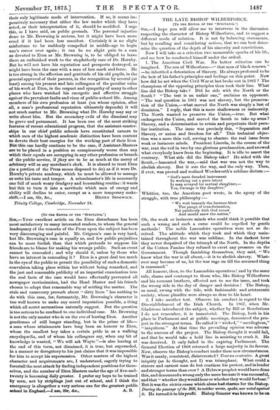[TO TIM EDFfOlit OF THE "SPECTATOR."]
Stn Your excellent article on the Eton disturbance has been most satisfactory to many interested readers, to whom the general inadequacy of the remarks of the Press upon the subject has been very discouraging and painful. Mr. Grignon's case is very hard, but Mr. Browning's case is equally so, and few public prejudices -can be more foolish than that which pretends to suppose his friends are to blame for making his wrongs public. Such an event cannot be concealed ; and why should it, unless by those who have an interest in concealing it ? Eton is a great deal too much in the eye of the public to permit the possibility of such a domestic =convulsion taking place within her without being remarked, and the just and reasonable publicity of an impartial examination into the real facts of the case would have effectually prevented all newspaper recrimination, had the Head Master and his friends chosen to adopt that reasonable way of settling the matter. The stale and unsavoury proverb about " dirty linen " has nothing to -do with this case, for, fortunately, Mr. Browning's character is too well known to make any moral imputation possible, a thing which all secret accusations naturally suggest. But the question is too serious to be confined to one individual case. Mr. Browning is not the only master who is on the eve of leaving Eton. Another gentleman of still longer standing, but in the prime of life— a man whose attainments have long been an honour to Eton, whom the smallest boy takes a certain pride in as a walking -encyclopaedia, and of whom his colleagues say, when any bit of knowledge is wanted, " We will ask Wayte "—is also leaving at the end of this term, not dismissed, it is true, but superseded, in a manner so derogatory to his just claims that it was impossible for him to accept his supersession. Other masters of the highest -character and acquirements are, I understand, eagerly trying to forestall the next attack by finding independent positions for them- selves, and the number of Eton Masters under the age of five-and- twenty is becoming daily greater. I prefer my boys to be trained by men, not by striplings just out of school, and I think the emergency is altogether a very serious one for the greatest public school in England.—I am, Sir, &c., A, B.


































 Previous page
Previous page